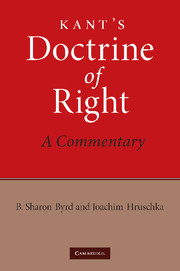Book contents
- Frontmatter
- Contents
- Introduction and methods of interpretation
- Chapter 1 The idea of the juridical state and the postulate of public law
- Chapter 2 The state of nature and the three leges
- Appendix to Chapter 2 Iustitia tutatrix, iustitia commutativa, and iustitia distributiva and their differences
- Chapter 3 The right to freedom
- Chapter 4 The permissive law in the Doctrine of Right
- Chapter 5 The external mine and thine
- Chapter 6 Intelligible possession of land
- Chapter 7 The “state in the idea”
- Chapter 8 The state in reality
- Chapter 9 International and cosmopolitan law
- Chapter 10 The “idea of public law” and its limits
- Chapter 11 Contract law I. Why must I keep my promise?
- Chapter 12 Contract law II. Kant's table of contracts
- Chapter 13 Criminal punishment
- Chapter 14 The human being as a person
- Appendix I to Chapter 14 On the logic of “‘ought’ implies ‘can’”
- Appendix II to Chapter 14 The system of rules of imputation
- Bibliography
- Index
Chapter 13 - Criminal punishment
Published online by Cambridge University Press: 05 June 2012
- Frontmatter
- Contents
- Introduction and methods of interpretation
- Chapter 1 The idea of the juridical state and the postulate of public law
- Chapter 2 The state of nature and the three leges
- Appendix to Chapter 2 Iustitia tutatrix, iustitia commutativa, and iustitia distributiva and their differences
- Chapter 3 The right to freedom
- Chapter 4 The permissive law in the Doctrine of Right
- Chapter 5 The external mine and thine
- Chapter 6 Intelligible possession of land
- Chapter 7 The “state in the idea”
- Chapter 8 The state in reality
- Chapter 9 International and cosmopolitan law
- Chapter 10 The “idea of public law” and its limits
- Chapter 11 Contract law I. Why must I keep my promise?
- Chapter 12 Contract law II. Kant's table of contracts
- Chapter 13 Criminal punishment
- Chapter 14 The human being as a person
- Appendix I to Chapter 14 On the logic of “‘ought’ implies ‘can’”
- Appendix II to Chapter 14 The system of rules of imputation
- Bibliography
- Index
Summary
In his review of the Doctrine of Right, Bouterwek critically notes that Kant first discusses the law of state before discussing criminal law. Yet, Kant cannot discuss criminal law elsewhere because for Kant punishment is inconceivable without a state. In the state of nature, attacks against another person can be warded off, but they cannot be punished. They cannot be punished because there are no external (positive) laws, no judge to impose punishment, and no executive officer to execute the punishments imposed. Similarly, a “punitive war” waged by states which are not yet in a juridical state of nation states is a “self-contradictory notion.” In their mutual relations, the states are still in the state of nature. They too have no external laws or judge to impose punishment, and no “commander,” to execute the punishment imposed.
Bouterwek's misunderstanding of Kant's theory of criminal punishment is matched by current trends in German legal theory insisting that Kant is a pure retributivist. Kant, in the Achenwall tradition, understands criminal law as a device the state uses to ensure individual rights by threatening punishment for their violation. Retribution is the standard for determining how much punishment may be threatened to deter crimes and executed in case of violation of the law. The retributive idea functions simply to protect a criminal offender from being used merely as a means to the goal of deterrence. The purpose of the criminal law for Kant is thus deterrence, with retribution playing a regulatory role.
- Type
- Chapter
- Information
- Kant's Doctrine of RightA Commentary, pp. 261 - 278Publisher: Cambridge University PressPrint publication year: 2010



